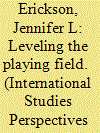| Srl | Item |
| 1 |
ID:
154921


|
|
|
|
|
| Summary/Abstract |
Why do states take the lead in diffusing norms they once resisted? I address this question in the context of new humanitarian arms trade norms, culminating in the 2013 Arms Trade Treaty (ATT). Although most major arms exporting states have supported the ATT and similar initiatives, only some have chosen to invest resources in becoming leaders of these initiatives to spread new norms beyond their borders. I examine British and German arms export policies and practices to argue that states that choose leadership following costly norm adoption may do so as a means to share the costs of those norms with other international actors and reduce future adaptation costs. By delving deeper into the agency of norm diffusion, the article offers insights into powerful states’ motivations for norm leadership following costly norm adoption, the dynamics of norm diffusion, and the institutional form international norms eventually take.
|
|
|
|
|
|
|
|
|
|
|
|
|
|
|
|
| 2 |
ID:
156228


|
|
|
|
|
| Summary/Abstract |
Why do states take the lead in diffusing norms they once resisted? I address this question in the context of new humanitarian arms trade norms, culminating in the 2013 Arms Trade Treaty (ATT). Although most major arms exporting states have supported the ATT and similar initiatives, only some have chosen to invest resources in becoming leaders of these initiatives to spread new norms beyond their borders. I examine British and German arms export policies and practices to argue that states that choose leadership following costly norm adoption may do so as a means to share the costs of those norms with other international actors and reduce future adaptation costs. By delving deeper into the agency of norm diffusion, the article offers insights into powerful states’ motivations for norm leadership following costly norm adoption, the dynamics of norm diffusion, and the institutional form international norms eventually take.
|
|
|
|
|
|
|
|
|
|
|
|
|
|
|
|
| 3 |
ID:
172427


|
|
|
|
|
| Summary/Abstract |
The persistence and strength of international norms are thought to depend partly on the willingness of actors to punish their violation, but norm enforcement is often inconsistent. This article investigates states’ use of economic sanctions in order to gain insight into the role of metanorms (norms about enforcing norms) in international politics and explain this inconsistency. The quantitative analyses examine patterns of economic sanctions and arms embargo practices across different security norms and reveal two central findings. First, international metanorms may accommodate important interstate relationships. Although severe human rights abuse, conflict, nuclear weapons development, and support for terrorist organisations tend to attract sanctions, they are infrequent in comparison with norm violations. Valued relationships between senders and targets seem to be an accepted limit to the pursuit of costly norm enforcement. Second, norm violations nevertheless remain rare, suggesting that factors other than the prospect of material punishment may encourage compliance. Indeed, by preserving interstate relationships, international metanorms may facilitate the engagement needed for socialisation and social pressures as alternative compliance mechanisms.
|
|
|
|
|
|
|
|
|
|
|
|
|
|
|
|
| 4 |
ID:
141305


|
|
|
|
|
| Summary/Abstract |
JENNIFER L. ERICKSON analyses the U.S. decision to support the UN Arms Trade Treaty initiative in October 2009. She argues that this support was part of a broader policy shift toward multilateralism that the Obama administration made in an effort to repair the reputation of the United States within the diplomatic community.
|
|
|
|
|
|
|
|
|
|
|
|
|
|
|
|
| 5 |
ID:
121795


|
|
|
|
|
| Publication |
2013.
|
| Summary/Abstract |
This article examines sending state compliance with arms embargoes. Arms embargoes are one of the most frequently used types of economic sanctions but they are perceived as one of the least effective. One major problem with arms embargoes, many argue, is sending states' failure to implement them. Yet studies tend to focus on cases of arms embargo violations, not compliance in the context of arms export practice more broadly. Using a series of new arms embargo variables, I conduct a statistical analysis of the relationship between arms embargoes and small and major conventional arms transfers from 1981 to 2004. Contrary to popular expectations, I find that arms embargoes on average restrain sending states' arms exports. If arms embargoes do indeed have difficulty changing targets' behavior, or achieving other measures of 'success', additional explanations must also be considered. I suggest that arms embargo target selection and the intractable challenge of cutting off illicit arms flows are two important plausible alternatives. This finding also provides optimism for compliance with international commitments in the absence of institutionalized enforcement mechanisms. Major exporters overall appear to implement sanctions, despite strong economic incentives to ignore them and a lack of formal accountability mechanisms to punish violators.
|
|
|
|
|
|
|
|
|
|
|
|
|
|
|
|